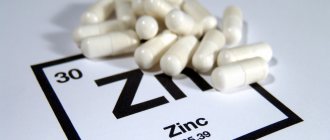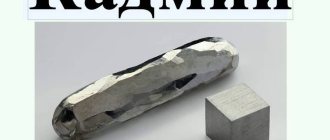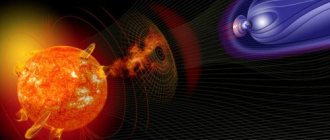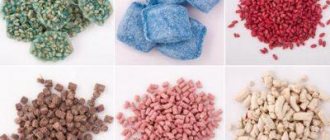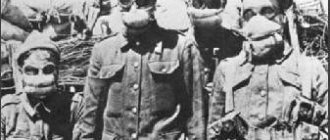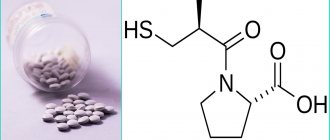Symptoms
In case of zinc poisoning, the following symptoms appear when it is absorbed in food and drinks:
- decreased protective capacity of the immune system;
- damage to the gastric mucosa;
- nausea;
- breathing problems;
- vomit.
Most of these symptoms appear quickly, but problems with the immune system may become noticeable only after some time.
Symptoms of zinc oxide poisoning from inhalation of this mixture:
- drowsiness;
- chills;
- suffocation;
- feeling of pressing pain in the chest area;
- cough (dry).
But the first symptoms are a sweetish taste in the mouth and thirst
.
If the body has been poisoned by salt compounds that contain zinc, then the sweetish taste is replaced by a metallic one, diarrhea, nausea, and a more extensive burn of the mucous membrane of the digestive system are observed; blood glucose levels and blood pressure change. Cramps in the legs, more precisely, in the calf muscles, and abdominal pain also begin.
With a chronic excess of zinc, there is a significant deterioration in the functioning of the immune system, including the occurrence of a number of autoimmune diseases. In case of chronic excess of zinc, weak nails and hair are observed, and the condition of the skin worsens. The pancreas, liver and prostate gland are subject to degenerative processes.
Causes of excess zinc in the body
No unhealthy diet can lead to an excess of zinc in the body. The most likely and common cause of excess zinc is taking medications and dietary supplements (dietary supplements) containing zinc.
It happens that the causes of excess zinc are low-quality packaging of drinks or products that provoke the formation of toxic zinc compounds. Therefore, caution should be exercised when eating foods packaged in questionable zinc or galvanized containers.
Often the causes of excess zinc are production factors, such as the use of zinc oxide, chloride and sulfate in the production of glass, artificial fiber, dental cement, ceramics, paints, and matches. Pulp and paper manufacturing, tinning and soldering, and wood preservation can also cause excess zinc.
Zinc and its excess in the solid state do not pose a threat to health, but its compounds are very toxic and cause significant disruption to the functionality of the body.
Zinc-rich foods
The body needs about 10 mg of zinc per day. If we consider the possibility of microelements being supplied through food, then only about 30% of the total substance content in them is absorbed by the body.
What foods contain zinc? Rich in this element (all numbers are per kilogram of product):
- Vegetables and fruits, in particular apples, citrus fruits, figs, herbs - about 0.25 mg.
- Bee products – a little more than 0.30 mg.
- Berries (black currants, raspberries, dates) – 2-8 mg. Approximately the same zinc content was found in the following foods: marine fauna, most vegetables, milk, lean beef, refined rice, bread, asparagus, celery, tomatoes, radishes, root vegetables.
- In products such as garlic, onions, brown rice, yeast, eggs - 8-20 mg.
- Oat and barley flour, molasses, cocoa, yolk, legumes, dried yeast, squid, young poultry and rabbit meat, nuts, green tea – 20-50 mg.
- Beef liver and some types of aquatic fauna – 30-85 mg.
- A lot of zinc is found in pumpkin and sunflower seeds, sprouted wheat and wheat bran - 130-200 mg.
Symptoms of deficiency
The main signs of zinc deficiency, unfortunately, are not only hair loss, splitting and stripes on the nails, but also:
- dry skin
- endometriosis
- acne
- decreased sense of smell
- irritability
- vision problems
- lack of ovulation
- decreased immunity
- deterioration of attention and memory
- allergic rashes on hands
A deficiency of the element can be caused by adherence to strict diets, as well as disorders of the thyroid gland or liver. Deficiency may occur during pregnancy and lactation.
https://www.youtube.com/watch?v=subscribe_widget
Adverse symptoms are also noticeable with high physical activity. It is important to understand that the amount of zinc will be consumed to a greater extent during training. Therefore, those who exercise for the purpose of losing weight often experience hair loss due to microelement deficiency. In this case, it is important to balance your diet with physical activity, otherwise it will lead to inevitable consequences.
Zinc deficiency (dietary zinc deficiency)
Ensuring the body's optimal need for this mineral has allowed nutritional medicine to achieve revolutionary successes in curbing a wide range of consequences of its deficiency - a list of these ailments includes schizophrenia and other mental disorders, diabetes, prostate adenoma, cataracts, heart disease, brain and nervous system damage, disorders immune system functions, poor digestion, ulcers, food allergies, toxic metal accumulation, poor wound healing, osteoporosis, skin diseases, fatigue, loss of appetite, hearing problems, eating disorders and a host of symptoms of blood sugar imbalance. Our earth is becoming increasingly poor in zinc, and a high-carbohydrate diet leaves us with even less. Calcium supplements and calcium-rich diets can reduce zinc absorption by up to 50%. Zinc is quickly eliminated from the body under stress (physical, emotional or chemical), as well as under the influence of toxic metals, pesticides and other environmental pollutants. Aging inevitably puts us at a disadvantage because the stomach does not produce enough acid to absorb this mineral. Based on the prevalence of zinc deficiency among sick elderly people, the use of supplements should probably be considered mandatory for all older people.
A whole range of neurological and neuropsychiatric disorders can be associated with zinc deficiency - epilepsy, schizophrenia, multiple sclerosis, Huntington's disease, dyslexia, acute psychosis, dementia, pathological aversion to food, attention problems and depression.
Zinc supplements may help prevent Alzheimer's disease. The zinc-dependent thymus hormone, thymulin, is almost undetectable in people affected by this disease, implying that zinc deficiency may play a role in the disease process.
People affected by AIDS are almost invariably zinc deficient , which contributes significantly to the ongoing decline of an already damaged immune system.
Malignant tumors develop more easily against the background of low zinc levels.
Symptoms of almost all skin diseases decrease or disappear when the body's zinc stores increase. In doses of 100 mg or more, it is particularly effective in treating acne, which some researchers believe is a condition caused by a deficiency of zinc, an essential fatty acid. The effects of supplements are not immediate—it may take weeks or months before you notice results on your skin.
Benign enlargement of the prostate gland (prostate adenoma), which has now reached almost epidemic proportions among men over fifty years of age, is inextricably linked with inadequate zinc intake throughout previous life. Urinary frequency and other symptoms of BPH are reliably reduced by using zinc supplements, especially when combined with saw palmetto (saw palmetto) extract, essential fatty acids, and several amino acids, including glycine, alanine, and glutamic acid. Zinc deficiency can also impair sperm production and testosterone production, while when a group of men over sixty were treated with zinc , their serum testosterone levels literally doubled.
Zinc deficiency can lead to a variety of pregnancy complications, including miscarriage, morning sickness, fetal growth restriction, and obstructed labor. Even a moderate daily dose of 22 mg tested in one study allowed women to give birth to significantly larger babies. Zinc doses of about 10-60 mg per day are completely safe to take during pregnancy.
Zinc levels in the body tend to be low in women experiencing premenstrual syndrome. It is possible that a deficiency of the mineral leads to a decrease in progesterone production, which, in turn, can cause cravings for sweet and salty foods. It is possible that zinc deficiency makes a certain contribution to one of the most common causes of blindness - macular degeneration. Taking supplements in doses of 100 to 200 mg may slow the progressive destruction of the retina that causes this condition. Forty percent of people with Crohn's disease are deficient in zinc , and replenishing your body's supply of this mineral is critical to overcoming this common digestive disorder. zinc supplements to the diet of children deficient in this mineral can reduce the incidence of dysentery and diarrhea.
For those affected by rheumatoid arthritis (an inflammatory joint disease), the body's zinc reserves tend to be severely depleted. When zinc levels in the body decrease from optimal levels, we become more vulnerable to the toxic effects of environmental pollutants. In one study of two hundred randomly selected people with chemical hypersensitivity, 54% had low zinc levels.
Vitamins and preparations with zinc
In pharmacies there is a large selection of drugs containing this trace element. Separate complexes are produced for men, women and children.
Why do we need vitamins with zinc? Many multivitamin complexes contain it: Vitrum, multi-tabs, complivit, oligovit. The content of this substance is sufficient to compensate for the lack of microelements.
Medicines and dietary supplements containing large amounts of microelements include:
- Zincteral.
- Zincite.
- Zinc from the Solgar company. Contains a small amount of trace elements.
- Qingkosan.
Consequences and complications of poisoning
An overdose of zinc or poisoning with vapors containing compounds of this substance can cause a wide range of complications, mostly of a long-term nature. Typical consequences:
- Anemia . Expressed in severe systemic anemia;
- Infertility . It manifests itself more strongly in men in the form of pathologies of the prostate and sperm production;
- Stunted growth. High doses of the element cause inhibition of growth hormone;
- Pneumosclerosis . Formation of homogeneous scar connective tissue instead of alveolar structures;
- Pathological change in the structure of fingers and nails . Chronic overdose causes growth pathologies of the above-mentioned body elements;
- Kidney and liver failure . Caused by a direct toxic effect on the tissues of these organs from individual metal compounds;
- Disturbance of metabolic and hormonal processes . Deterioration of the metabolism of a number of substances. Systemic zinc and compound poisoning can cause long-term problems with the absorption and metabolism of a number of nutrients and enzymes.
Symptoms of zinc poisoning from welding
Zincum consists of five isotopes. There are also 15 known radioactive nuclei of the chemical element. Zinc reacts well with many metals. Reacts well with acids, alkalis, ammonium salts, molecular chromium and bromine. This far from complete list of physical and chemical properties allows the substance to be used in a wide variety of branches of human activity.
Zinc poisoning in most cases occurs at industrial sites. There is no pure metal in nature; it is obtained by exposure to high temperatures and various chemical compounds. During the melting process (for example, when welding pipes), zinc oxide will release vapors and a fine aerosol.
Particles enter the body through inhalation and ingestion. Metal has an irritating effect on mucous membranes. Settling on the walls of the organs of the upper and lower respiratory tract, it causes coughing, inflammation of the bronchi and lungs. In severe cases, holes may form in the plate separating the nasal passages. When ingested, it causes dyspeptic disorders - nausea, vomiting, diarrhea.
Zinc dust tends to settle on the skin, causing ulcerations, especially on the back of the hands.
When to Seek Medical Help
Zinc poisoning is a severe intoxication. If high doses of metal enter the body, it is necessary to be examined. Hospitalization is necessary under the following conditions:
- when providing independent first aid, the victim’s condition only worsens;
- the person vomits continuously, blood admixtures are observed in the masses;
- the skin changes color to pale, fingers and toes become cold;
- young children, pregnant women, and elderly people are subject to unconditional hospitalization;
- the victim rolls his eyes, a comatose state is observed.
As a rule, the enterprise always has a full-time medical employee capable of providing qualified first aid. If you call an ambulance at the first signs of intoxication, you will be able to avoid serious consequences.
How to choose and how to take
Now there is a large selection of zinc supplements on the market, and each brand offers its own dosages and different processing. Among them, there are different effective options for preventing deficiency. Chelated zinc is a good option, as are picolinate, citrate and monomethionine. The acetate form and gluconate will be of average bioavailability. The worst form is zinc sulfate and zinc oxide.
Many companies indicate the form of processing of the element on the front of the package. But it’s better to look at it from the reverse side, in the components. The dosage is indicated for one or two tablets.
Zinc combines quite well with vitamin B6 and magnesium, so they can be taken in combination. The nutrient has poor compatibility with vitamin E. As well as with copper, folic acid, iron and calcium. This does not mean that it is not advisable to take other substances. This means that they do not need to be taken at one time and it is better to take them at large intervals over time.
With intense physical activity, the dosage is increased by 2 or even 3 times. The classic dose for an athlete is 30 mg. It is divided into several doses during the day so as not to cause excess. Levels are best monitored through testing and at the discretion of your doctor.
Why is it so important
Zinc takes an active part in the following processes:
- protein synthesis
- hair and nail growth
- skin cell renewal
- formation of collagen fibers
- reduction of allergies
- prevention of early wrinkles
- healing of small cracks and wounds
It is very important to diagnose zinc, because this indicator serves 2200 enzymes and proteins. What is this element for?
Half of those proteins and enzymes have immune function, while the other half are responsible for pressure in the bloodstream, breathing in the lungs and beating the heart.
Nutritionists recommend taking a blood test for zinc and watching it over time. If your indicator is at the lower limit, then you definitely need to replenish the nutrient.
Zinc helps the work of phagocytes, which destroy microbes and viruses that enter the body. This important element is a natural immunomodulator and antioxidant that can stop the spread of viral infections.
To avoid a serious immune reaction after a cold in the form of a cold, you need to compensate for the zinc deficiency. This is an important tool that doctors use in their treatment regimens at the first sign of a cold.
In addition, zinc stimulates parts of the brain that are responsible for concentration and memory improvement.
Modern diagnostic methods
The basis of diagnosis is the determination of zinc marker in blood plasma, red blood cells, urine and hair. The most informative way is to determine the level of the element in the blood serum. An indicator of 13 µmol/l is regarded as a deficiency state, and a marker below 8.2 µmol/l is unfavorable.
It should be noted that a deficiency in the blood does not always manifest itself with clinical symptoms, since the concentration of the substance falls and rises throughout the day. The indicator varies depending on the food consumed, stress, infectious process, and disruption of blood plasma collection.
During diagnostic manipulations, it is necessary to take into account not only the level of the element in the blood, but also the positive dynamics of clinical signs, as well as an increase in the marker in response to treatment with drugs containing zinc.
The biological material is blood taken from a vein. No special preparation is required for the test. It is forbidden to consume food 2-3 hours before the manipulation, as the level of the substance decreases after eating. This may cause incorrect results. In 30 min. You should stop smoking before the test
Interpretation of the results is carried out taking into account data from another study. Atomic absorption spectroscopy (AAS) is indicated. Presents a method for quantitative urine analysis.
Based on the ability of atoms to absorb light of a certain wavelength (resonant absorption) and influence signals emanating from other atoms contained in the atomizer. Approximately 60 chemical elements (mainly metals and a number of transition elements) can be determined using the AAS method.
In Moscow, a blood test for zinc content will cost 700-970 rubles. The research method using ACC, including sample preparation, will cost 1,300 rubles.
In Samara, a blood plasma test will cost 430–650 rubles. Analysis using the ACC method will cost 1000-1200 rubles.
The table is normal
The table shows normal indicators for women of different age categories.
| Age | Norm | Pregnancy period | Lactation period |
| 0—6 months | 2 mg | ||
| 7-12 months | 3 mg | ||
| 1-3 years | 3 mg | ||
| 4-8 years | 5 mg | ||
| 9-13 years | 8 mg | ||
| 14-18 years old | 9 mg | 12 mg | 13 mg |
| 19+ | 8 mg | 11 mg | 12 mg |
How should you eat to get enough zinc?
A proper diet helps correct mineral deficiency. The daily requirement is 9 mg for women and 11 mg for men. Zinc can be easily obtained by including oysters, beef, fortified grains, baked beans, crab or lobster, nuts, cheese, oats, chicken and yogurt. We recommend reading about this in detail in a separate article.
When taking zinc supplements, you need to be careful, since its excess (over 40 mg per day) blocks the absorption of iron and copper and also causes side effects (vomiting, diarrhea, loss of appetite, headache).
Of the artificial zinc preparations, the safest are multivitamins containing 15 mg of the mineral. However, in this case too... [read full version]
Zinc deficiency
The first sign of a microelement deficiency in the body is slower growth. A person’s sense of taste also deteriorates.
Systematic zinc deficiency leads to a decrease in the immune barrier and disruption of all metabolic processes. A weakened immune system is defenseless against attacks from various viral infections; this is especially noticeable when hormones are produced by the thymus, one of the most important reproducers of protective cells (lymphocytes). A lack of zinc affects the ability of lymphocytes to divide, which usually occurs in response to the attack of various infections.
Zinc deficiency leads to complications of various pathologies, for example, cardiovascular diseases, liver cirrhosis, atherosclerosis. Due to a lack of microelement, the reproductive organs suffer; in a young body, this can manifest itself as a delay in puberty.
Other manifestations include: “night blindness”, loss of appetite, weakening and loss of hair, dermatitis. If a child does not eat well, his body develops poorly and does not correspond to age-related development, then this baby has a clear zinc deficiency.
